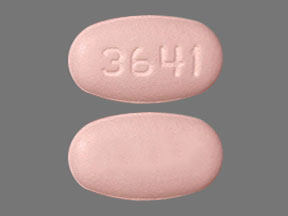Evotaz Dosage
Generic name: ATAZANAVIR SULFATE 300mg, COBICISTAT 150mg
Dosage form: tablet
Drug class: Antiviral combinations
Medically reviewed by Drugs.com. Last updated on May 12, 2023.
Laboratory Testing Prior to Initiation and During Treatment with EVOTAZ
Renal Testing
Renal laboratory testing should be performed in all patients prior to initiation of EVOTAZ and continued during treatment with EVOTAZ. Renal laboratory testing should include estimated creatinine clearance, serum creatinine, and urinalysis with microscopic examination [see Warnings and Precautions (5.5,5.6)]. Cobicistat decreases estimated creatinine clearance due to inhibition of tubular secretion of creatinine without affecting actual renal glomerular function [see Warnings and Precautions (5.3)].
When coadministering EVOTAZ with tenofovir disoproxil fumarate (tenofovir DF), assess estimated creatinine clearance, urine glucose, and urine protein at baseline and routinely monitor during treatment. In patients with chronic kidney disease, also monitor serum phosphorus [see Warnings and Precautions (5.4)].
Hepatic Testing
Hepatic laboratory testing should be performed in patients with underlying liver disease prior to initiation of EVOTAZ and continued during treatment with EVOTAZ [see Warnings and Precautions (5.7)].
Recommended Dosage
EVOTAZ is a fixed-dose tablet containing 300 mg of atazanavir and 150 mg of cobicistat. The recommended dosage of EVOTAZ is one tablet taken once daily orally with food [see Clinical Pharmacology (12.3)] in HIV-1-infected treatment-naïve and treatment-experienced:
- •
- Adult patients
- •
- Pediatric patients weighing at least 35 kg
Administer EVOTAZ in conjunction with other antiretroviral agents [see Drug Interactions (7)]. Dose separation may be required when taken with H2-receptor antagonists or proton-pump inhibitors [see Drug Interactions (7.2, 7.3)].
Dosage in Patients with Renal Impairment
EVOTAZ is not recommended in treatment-experienced patients with HIV-1 infection who have end-stage renal disease managed with hemodialysis [see Use in Specific Populations (8.6) and Clinical Pharmacology (12.3)].
EVOTAZ coadministered with tenofovir DF is not recommended in patients with estimated creatinine clearance below 70 mL/min. Coadministration of EVOTAZ and tenofovir DF in combination with concomitant or recent use of a nephrotoxic agent is not recommended [see Warnings and Precautions (5.4) and Adverse Reactions (6.1)].
Not Recommended in Patients with Any Degree of Hepatic Impairment
EVOTAZ is not recommended in patients with any degree of hepatic impairment [see Warnings and Precautions (5.7), Use in Specific Populations (8.7), and Clinical Pharmacology (12.3)].
Not Recommended During Pregnancy
EVOTAZ is not recommended for use during pregnancy and should not be initiated in pregnant individuals due to substantially lower exposures of cobicistat and consequently, lower exposures of atazanavir, during the second and third trimesters. An alternative regimen is recommended for individuals who become pregnant during therapy with EVOTAZ [see Use in Specific Populations (8.1)].
More about Evotaz (atazanavir / cobicistat)
- Check interactions
- Compare alternatives
- Pricing & coupons
- Drug images
- Side effects
- During pregnancy
- FDA approval history
- Drug class: antiviral combinations
- En español
Patient resources
Professional resources
Related treatment guides
Further information
Always consult your healthcare provider to ensure the information displayed on this page applies to your personal circumstances.


